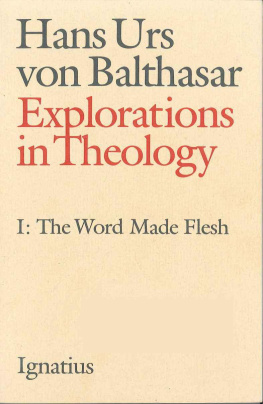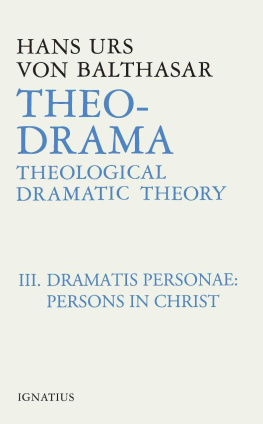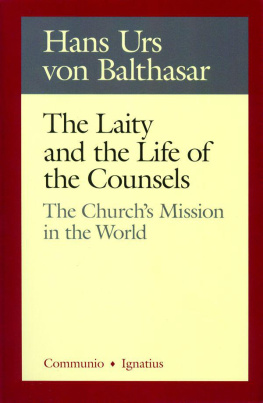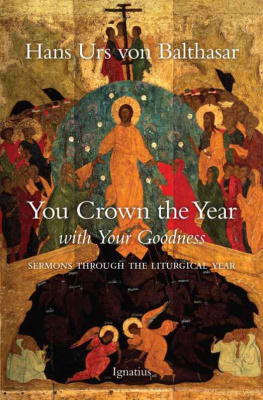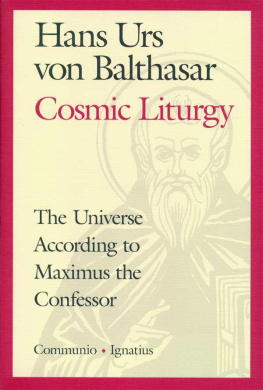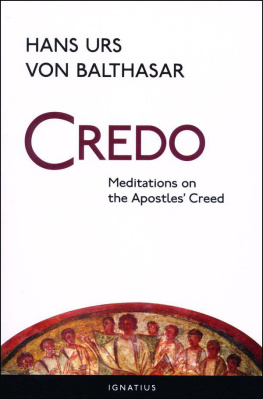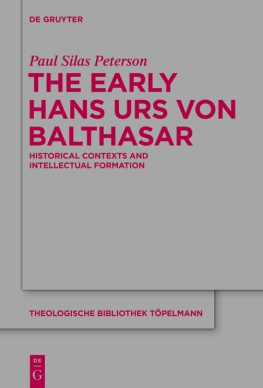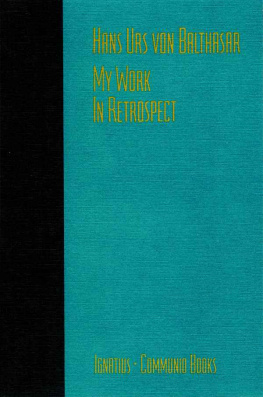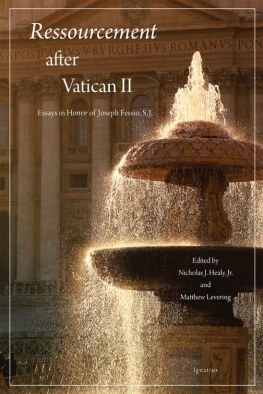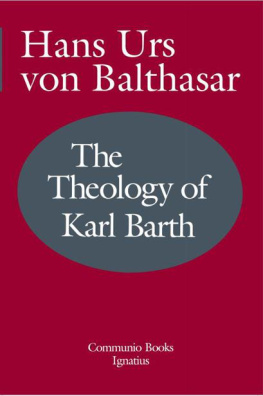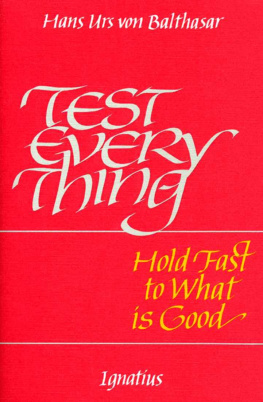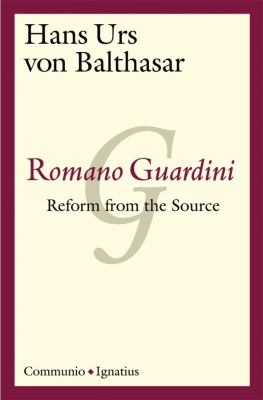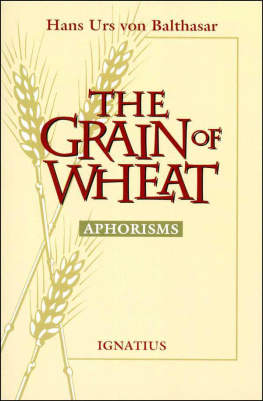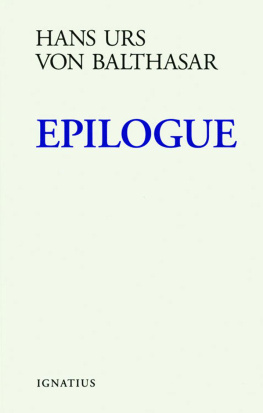EXPLORATIONS IN THEOLOGY
THE WORD MADE FLESH
HANS URS VON BALTHASAR
THE WORD MADE FLESH
Explorations in Theology
I
IGNATIUS PRESS SAN FRANCISCO
Title of the German original:
Verbum Caro (Skizzen zur Theologie I )
1960 Johannes Verlag, Einsiedeln
First English edition:
Word and Revelation: Essays in Theology I
Translated by A. V. Littledale with Alexander Dru
1964 Herder and Herder, New York
Word and Redemption: Essays in Theology 2
Translated by A.
V. Littledale with Alexander Dru
1965 Herder and Herder, New York
Cover by Roxanne Mei Lum
With ecclesiastical approval
1989 Ignatius Press, San Francisco
All rights reserved
ISBN 978-0-89870-265-1
Library of Congress catalogue number 89-84207
Printed in the United States of America
CONTENTS
Word and Revelation
Word and Redemption
INTRODUCTION
The papers collected in this volume are not formal theological treatises as such. Rather, as outlines and suggestions, they pattern the general nature of a sketchbook, and make no claim to finality. Human work however is necessarily incomplete, so that it may well happen that here and there we will catch on the wing, as it were, an idea that a more academic work may overlook. Nor should it be surprising that in a sketchbook certain themes constantly recur, that various concepts are approached and studied from many anglesthis kind of repetitiveness and overlapping is due to the fascination generated by the unseen core of the subject matter. The figure studies of Rodin or Mares for example consist of outline sketches of an arm or a leg superimposed or juxtaposed; whether they represent a groping after the one correct curve, or whether, in fact, they represent the only possible way of reproducing human motion is impossible to ascertain. And so it is with the following essays in theology.
WORD AND REVELATION
THE WORD, SCRIPTURE AND TRADITION
Scripture is the word of God that bears witness to Gods Word. The one Word therefore makes its appearance as though dividing into a word that testifies and into a Word to whom testimony is given. The Word testified to is Jesus Christ, the eternal Word of the Father, the Word who took flesh in order to witness, represent and be, in the flesh, the truth and life of God. The entire revelation concerning salvation is ordered to this manifestation of the Word, as to a central pointin a forward direction in the apostles and in the whole history of the Church to the end of time, in a backward direction in the Old Testament revelation in word and history, backward to the law and the prophets and even to the creation; for God upholds all things by the word of his power (Heb 1:3), creates all things through, for and by his Word. The Word is at the head of all things and by him all things consist (Col 1:16-17); and not only is the Word the divine Logos, for the Son of Man is the first and the last (Apoc 1:18).
The testifying word is the sequence of scripture from Genesis to the Apocalypse which accompanies the progressive revelation of the Word in the flesh and which reflects it as if a mirrora function which distinguishes it from the former Word. The word of revelation is the Word in the mode of action: God is apprehended in the act of self-communication. The word of scripture is the Word in the mode of contemplating his own action, recording and elucidating it, something which can only be performed properly and perfectly by the Word himself, since God alone compasses the entire range of his revelation; and only he can assign a valid human expression for it. The word of revelation is primarily the Son, who speaks of the Father through the Holy Spirit. The word of scripture is primarily the work of the Holy Spirit who as Spirit of the Father effects, accompanies, illumines and clarifies the Sons incarnation (before and after the event), and who as Spirit of the Son, embodies his self-manifestation in permanent, timeless forms.
At first sight therefore the two lines of the testified and the testifying Word seem to run parallel, but this appearance is deceptive. For both forms of the Word are ultimately the one Word of God testifying to itself in the one revelation.
Two sets of considerations can help clarify this concept.
1. There are, it is true, certain passages in which the contrast between the two forms of the Word is plainly evident. In the gospel for example the Lord speaks, acts and suffers without reference to the written account, i.e., to the gospel. This account was written down only later by eyewitnesses under the guidance of the Holy Spirit, who is already active here as the Spirit of the Church. The Spirit has become, as it were, the most attentive hearer of the Word, but who, because he himself is a divine Person, sets down the divine truth in writing such as he heard it as Spirit and as he deems it important for the Church. The same is true for all that the apostles did and for the book of the Acts, as well as for all the historical books of the Old Testament, although the two forms of the Word are far less distinct in the prophets and in the Apocalypse. It is true of course that even then the word may first have come to the prophets personally, in a private revelation, and the publication made subsequently, in which case it makes no difference whether this revelation was first oral and afterward put in writing, or whether, on occasion, it was taken in written form from the outset. Revelation to the prophets and promulgation by the prophets tend to merge together, and form virtually a single act of revelation effected by the Spirit in the service of the coming or past incarnation of the Son. Both acts constitute so complete a unity that there is no reason to postulate a revelation prior to its committal to writing, as for instance in the sapiential books where the revelation is transmitted directly to the pen of the inspired writer. The same is true for the epistles of the New Testament, Admittedly, in the seven letters of the Apocalypse, a certain distinction is required inasmuch as the Spirit first dictates the letters to the churches to the Apostle John who then, either at once or at some later time, writes them down; the same is not true of the other epistles. Yet we must not overlook the expository, quasi-contemplative character of both the sapiential books and the apostolic epistles. Just as the former interpret the history of the Jews and their law for the people of God, so do the latter interpret the gospel for the Church. The upshot is that the relationship between the testified and the testifying Word is a fluid one, varying from clear contrast to actual identity. Revelation then is effected partly before the writing, partly in the actual writing; in other words, scripture participates in Gods self-revelation in Jesus Christ through the Spirit.
2. The second line of thought takes us deeper, and definitely rules out the idea of a parallelism between the testified and the testifying Word. The central Word which God speaks and which comprises, as their unity and end, all the manifold words of God is Jesus Christ, the incarnate God. He however made his appearance in the sign of obedience, to fulfill the will of the Father, and thereby to redeem and justify the creation. He fulfills it inasmuch as he lets his earthly life as Word made flesh be fashioned, step by step, by all the forms of the word in the law and the prophets. His life is a fulfilling of scripture. Therefore he assimilates the scriptural word into his own life, making it live and there take flesh, become wholly actual and concrete. As his life proceeds two things stand out: the Word more and more becomes flesh, inasmuch as he imparts to the abstract nature of the law and the expectancy of prophecy the character of a divine, factual presence, and the flesh becomes more and more Word, inasmuch as he increasingly unifies the scriptural words in himself, making his earthly life the perfect expression of all the earlier revelations of God. He is their living commentary, their authentic exposition, intended as such from the beginning. He fulfills not only the Word of the Father coming down from heaven, but equally the word stored up for him in history and the tradition of scripturethe Word, that is to say, both in its vertical and horizontal provenance.
Next page
